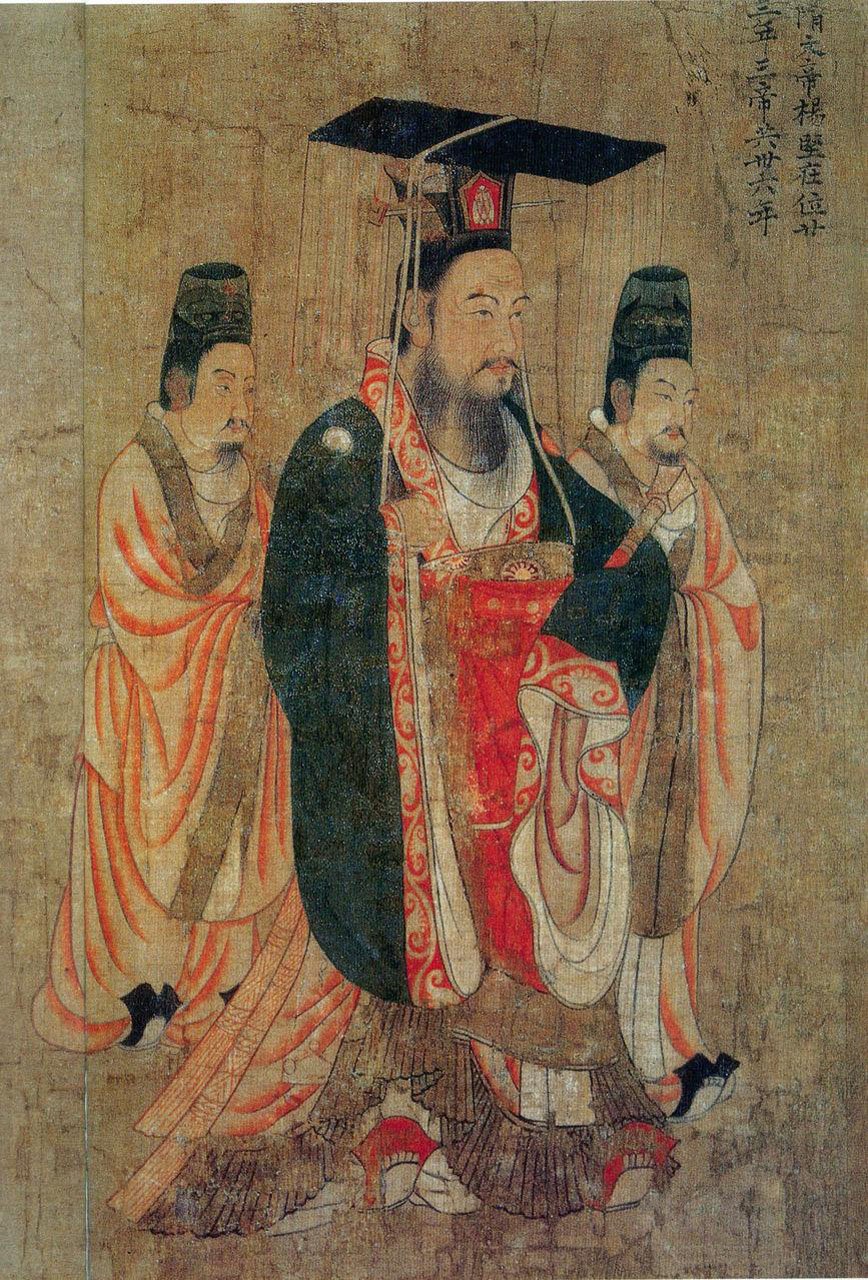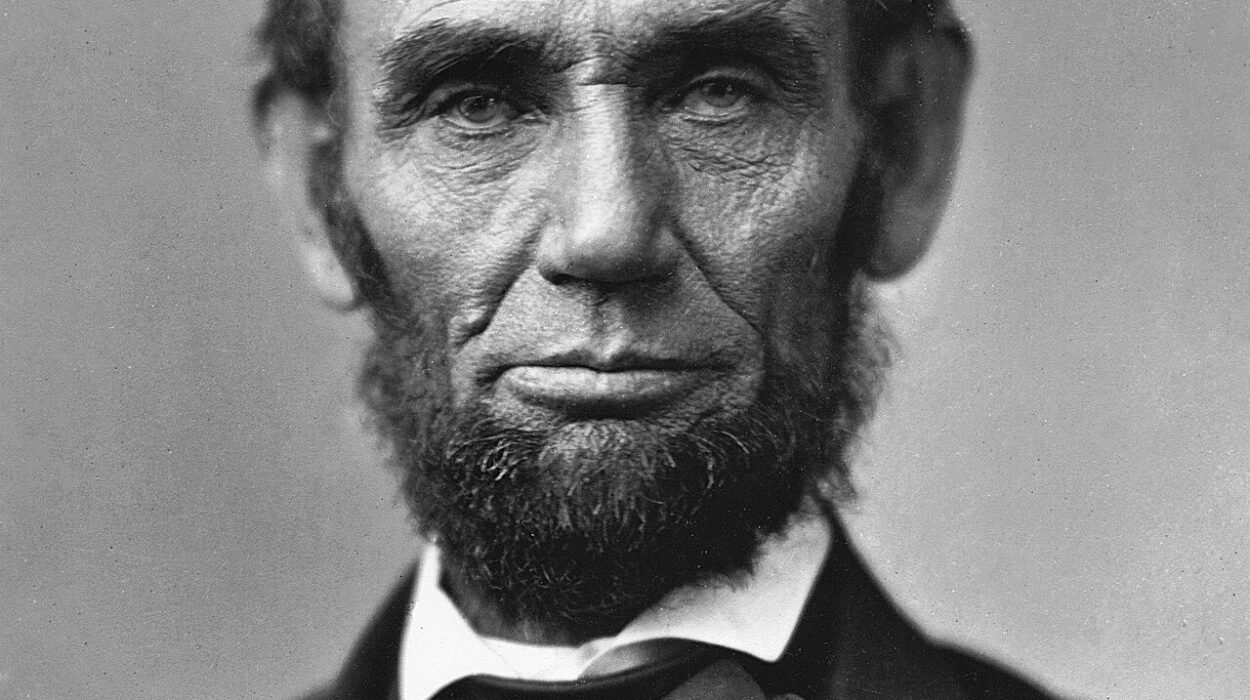Emperor Wen of Sui (541–604), born Yang Jian, was the founder and first emperor of the Sui Dynasty in China, reigning from 581 to 604. He is best known for unifying China after nearly four centuries of fragmentation following the fall of the Han Dynasty, bringing an end to the period known as the Northern and Southern Dynasties. A capable and ambitious ruler, Emperor Wen implemented sweeping reforms that centralized power, strengthened the imperial government, and restructured the economy. His policies included land redistribution, tax reforms, and the construction of the Grand Canal, which improved trade and communication across the empire. He also promoted Buddhism as a unifying cultural force. Emperor Wen’s reign laid the foundation for the prosperity of the subsequent Tang Dynasty. However, his strict rule and heavy taxation also led to unrest, which eventually contributed to the Sui Dynasty’s fall shortly after his death.
Early Life and Rise to Power
Yang Jian was born in 541 AD in the northwestern region of China, during a time when the country was divided into several warring states following the collapse of the Western Jin Dynasty. His family, though noble, was of mixed heritage, with Chinese, Xianbei, and possibly other ethnicities, which reflected the diverse and fragmented nature of the society in which he was born. Yang Jian’s father, Yang Zhong, served as a military officer under the Western Wei and later Northern Zhou dynasties, which were part of the Northern Dynasties that controlled much of northern China.
From a young age, Yang Jian exhibited remarkable intelligence and leadership qualities, which were recognized by his father and others in the Northern Zhou court. He received a classical education, studying Confucian texts, military strategy, and governance, which prepared him for future leadership. His rise to power was facilitated by his marriage to Dugu Qieluo, a noblewoman from a powerful family, whose support would prove crucial throughout his life.
In 573 AD, Yang Jian’s fortunes changed dramatically when Emperor Wu of Northern Zhou appointed him as the Duke of Sui, a prestigious title that signaled his rising influence within the court. Over the next few years, Yang Jian skillfully navigated the treacherous political landscape of the Northern Zhou court, building alliances and consolidating his power. When Emperor Wu died in 578 AD, Yang Jian served as a regent for the young Emperor Jing, but it soon became clear that he held the real power.
In 581 AD, after neutralizing his rivals and securing the loyalty of key military leaders, Yang Jian forced Emperor Jing to abdicate, and he proclaimed himself Emperor Wen of Sui. This marked the beginning of the Sui Dynasty, a new era in Chinese history. His rise to power, though marked by some bloodshed, was relatively swift and smooth, reflecting his political acumen and the exhaustion of the Northern Zhou aristocracy, who had long been plagued by internal conflicts.
Reunification of China
One of Emperor Wen’s most significant achievements was the reunification of China, which had been divided into several rival states for nearly three centuries. By the time he ascended the throne in 581 AD, China was divided into the Northern Dynasties, which controlled the north, and the Southern Dynasties, which held the south. The constant warfare between these states had devastated the country, leading to widespread suffering and economic decline.
Emperor Wen’s vision for China was one of unity and stability, and he embarked on a series of military campaigns to bring the southern states under his control. His primary target was the Chen Dynasty, the last of the Southern Dynasties, which controlled the fertile and economically vital Yangtze River region. The Chen Dynasty was weakened by internal strife and a lack of strong leadership, making it vulnerable to invasion.
In 588 AD, Emperor Wen launched a massive military campaign against the Chen Dynasty, mobilizing hundreds of thousands of troops. The Sui army, well-trained and equipped, quickly overwhelmed the Chen forces. In 589 AD, the Sui forces captured the Chen capital of Jiankang (modern-day Nanjing), effectively bringing an end to the Chen Dynasty and completing the reunification of China. The fall of the Chen Dynasty was a turning point in Chinese history, as it marked the first time in nearly 300 years that the country was unified under a single ruler.
Emperor Wen’s reunification of China was not only a military achievement but also a political and ideological one. He promoted the idea of a centralized, bureaucratic state governed by Confucian principles, which helped to legitimize his rule and stabilize the country. He also implemented a series of reforms to consolidate his control over the newly unified empire, including the establishment of a new capital at Daxing (modern-day Xi’an), which would serve as the political and cultural center of China for centuries.
Political and Economic Reforms
Emperor Wen was not only a military leader but also a visionary reformer who implemented sweeping changes to the political and economic systems of China. His reforms were aimed at centralizing power, increasing the efficiency of the government, and promoting economic growth. These reforms laid the foundation for the stability and prosperity that China would enjoy during the early years of the Tang Dynasty.
One of Emperor Wen’s most significant political reforms was the establishment of a highly centralized bureaucracy. He reorganized the government into a series of ministries and departments, each with specific responsibilities, and staffed them with capable officials chosen through a meritocratic system. This system, which would later evolve into the imperial examination system, ensured that the most talented individuals, rather than those with noble birth or connections, held key positions in the government. This helped to reduce corruption and increase the efficiency of the administration.
In addition to his political reforms, Emperor Wen also implemented a series of economic reforms aimed at increasing agricultural productivity and promoting trade. He introduced a new land distribution system known as the “Equal-Field System,” which allocated land based on the needs and capabilities of each household. This system helped to reduce the power of the aristocracy, who had previously controlled vast estates, and ensured that more land was available for cultivation. The increased agricultural output not only improved the standard of living for the general population but also provided a stable source of revenue for the government through taxes.
Emperor Wen also invested in infrastructure projects to promote economic growth. He ordered the construction of the Grand Canal, a massive waterway that connected the Yellow River in the north with the Yangtze River in the south. The canal facilitated the transport of grain and other goods between the northern and southern regions of the empire, helping to integrate the economy and promote trade. The Grand Canal would remain a vital artery of Chinese commerce for centuries.
These political and economic reforms, while initially successful, also laid the groundwork for some of the challenges that would emerge later in the Sui Dynasty. The centralization of power and the emphasis on large infrastructure projects placed significant demands on the population, leading to widespread discontent and contributing to the eventual decline of the dynasty. Nonetheless, Emperor Wen’s reforms were a critical factor in the success of his reign and the stability of the early Tang Dynasty.
Cultural and Religious Policies
Emperor Wen was a deeply religious man, and his reign was marked by a significant revival of Buddhism in China. He believed that Buddhism could serve as a unifying force in the newly reunified empire and sought to promote the religion as a means of stabilizing and legitimizing his rule. His promotion of Buddhism was part of a broader cultural policy aimed at creating a more cohesive and harmonious society.
One of Emperor Wen’s first acts as emperor was to restore and build Buddhist temples across the empire. He provided state support for the construction of monasteries and the copying of Buddhist scriptures, and he encouraged his officials and subjects to practice Buddhism. The emperor himself was known to have taken vows as a lay Buddhist and often engaged in religious ceremonies and rituals. This personal commitment to Buddhism helped to promote the religion among the elite and the general population.
In addition to Buddhism, Emperor Wen also supported Confucianism, which had long been the dominant ideology in Chinese governance. He believed that Confucianism provided a moral and ethical foundation for the state, and he sought to integrate its principles into the legal and administrative systems. He commissioned the compilation of legal codes and administrative regulations based on Confucian principles, which helped to strengthen the rule of law and promote social harmony.
Emperor Wen’s cultural policies also extended to the arts and education. He encouraged the production of literature, poetry, and art, and he promoted the study of classical Chinese texts. His reign saw a flourishing of cultural activity, with scholars, artists, and writers producing works that reflected the values and ideals of the Sui Dynasty. The emperor himself was a patron of the arts, and his court became a center of cultural and intellectual life.
While Emperor Wen’s promotion of Buddhism and Confucianism helped to create a more cohesive society, it also led to tensions with other religious and philosophical traditions, particularly Daoism. The emperor’s preference for Buddhism and Confucianism sometimes led to the marginalization of Daoist practices and beliefs, which had been popular in certain regions of China. Despite these tensions, Emperor Wen’s cultural and religious policies were generally successful in promoting unity and stability in the empire.
Challenges and Decline
Despite his many successes, Emperor Wen’s reign was not without its challenges. The ambitious nature of his reforms and military campaigns placed significant strain on the population and the economy, leading to growing discontent in the later years of his reign. These challenges, coupled with internal court intrigues and succession disputes, ultimately contributed to the decline of the Sui Dynasty.
One of the most significant challenges Emperor Wen faced was the growing burden of taxation and labor demands on the population. His large-scale infrastructure projects, such as the construction of the Grand Canal and the rebuilding of the Great Wall, required vast amounts of labor and resources. These projects, while beneficial in the long term, placed heavy demands on the peasantry, leading to widespread hardship and resentment. The constant military campaigns, particularly in the northern regions against the Gokturks and in the southern regions to suppress rebellions, further exacerbated the strain on the empire. Emperor Wen’s efforts to secure the borders and maintain control over the newly unified territory required a significant mobilization of troops and resources. These campaigns, while initially successful, led to a heavy toll on the empire’s finances and manpower. As taxes and labor demands increased, the burden on the peasantry grew, leading to widespread discontent and eventually to open rebellion in various parts of the empire.
In addition to these external challenges, Emperor Wen also faced internal problems within his court. His efforts to centralize power and reduce the influence of the aristocracy led to growing tensions among the ruling elite. The nobility, who had traditionally held significant power and autonomy, were increasingly marginalized as Emperor Wen implemented his reforms. This led to resentment and opposition from powerful families, some of whom conspired against the emperor.
The situation was further complicated by succession issues. Although Emperor Wen was a capable and effective ruler, his relationship with his eldest son and heir, Yang Guang, later known as Emperor Yang of Sui, was strained. Yang Guang, ambitious and eager for power, began to maneuver against his father in the later years of Emperor Wen’s reign. While Emperor Wen was still alive, Yang Guang consolidated his influence within the court, building alliances and securing his position as the next emperor. This internal power struggle created instability within the court and contributed to the weakening of the central authority.
As Emperor Wen aged, his health began to decline, and his ability to manage the empire’s affairs weakened. In 604 AD, after a reign of 23 years, Emperor Wen died under suspicious circumstances. There are historical accounts suggesting that Yang Guang may have played a role in his father’s death, although the exact details remain unclear. With Emperor Wen’s death, Yang Guang ascended to the throne as Emperor Yang of Sui.
Emperor Yang’s rule would prove disastrous for the Sui Dynasty. Unlike his father, who had focused on consolidating and stabilizing the empire, Emperor Yang embarked on reckless military campaigns and extravagant construction projects that further strained the empire’s resources. His rule led to widespread revolts, and within a few years of Emperor Wen’s death, the Sui Dynasty began to unravel.
Legacy of Emperor Wen
Despite the challenges and eventual decline of the Sui Dynasty, Emperor Wen’s reign remains one of the most significant in Chinese history. His achievements in reunifying China and laying the foundations for a centralized, bureaucratic state had a lasting impact on the country’s development. While his dynasty was short-lived, the institutions and policies he established were carried forward by the succeeding Tang Dynasty, which is often regarded as one of the greatest periods in Chinese history.
Emperor Wen’s legacy can be seen in several key areas. First and foremost, his reunification of China ended centuries of division and warfare, creating a unified state that would endure for centuries. This achievement alone places him among the most important rulers in Chinese history. His military campaigns, while costly, succeeded in bringing the entire Chinese heartland under a single administration, restoring a sense of order and stability that had been lacking since the fall of the Han Dynasty.
In addition to his military accomplishments, Emperor Wen’s political and administrative reforms transformed the way China was governed. His establishment of a centralized bureaucracy staffed by officials chosen for their merit rather than their birth laid the groundwork for the imperial examination system, which would become a cornerstone of Chinese governance for over a thousand years. This system helped to create a more efficient and responsive government, reducing corruption and increasing the effectiveness of the administration.
Economically, Emperor Wen’s reforms, particularly the Equal-Field System and the construction of the Grand Canal, helped to boost agricultural production and promote trade. These policies not only improved the livelihoods of the Chinese people but also provided a stable economic foundation for the empire. The Grand Canal, in particular, became one of the most important infrastructure projects in Chinese history, facilitating the movement of goods and people across the empire and contributing to the economic integration of the north and south.
Culturally, Emperor Wen’s support for Buddhism helped to establish the religion as a major force in Chinese society. His patronage of Buddhist temples and monasteries contributed to the spread of the religion throughout the empire, and his personal devotion to Buddhism helped to legitimize the faith in the eyes of the Chinese people. While his promotion of Buddhism sometimes created tensions with other religious traditions, it also enriched the cultural and spiritual life of the empire.
However, Emperor Wen’s legacy is not without its complexities. While his reforms and policies were instrumental in stabilizing and strengthening the empire, they also placed significant demands on the population, leading to widespread hardship and, eventually, rebellion. The centralization of power, while effective in the short term, created tensions within the ruling elite that contributed to the instability of the Sui Dynasty after his death.
Ultimately, Emperor Wen of Sui is remembered as a visionary leader who played a crucial role in shaping the course of Chinese history. His reign marked the beginning of a new era of unity and stability, and his achievements laid the foundation for the prosperity of the Tang Dynasty. While his dynasty may have been short-lived, his impact on China was profound and enduring, making him one of the most important figures in the history of the country.



